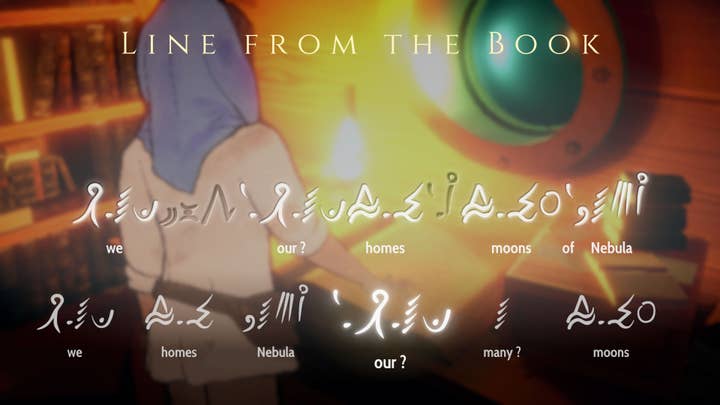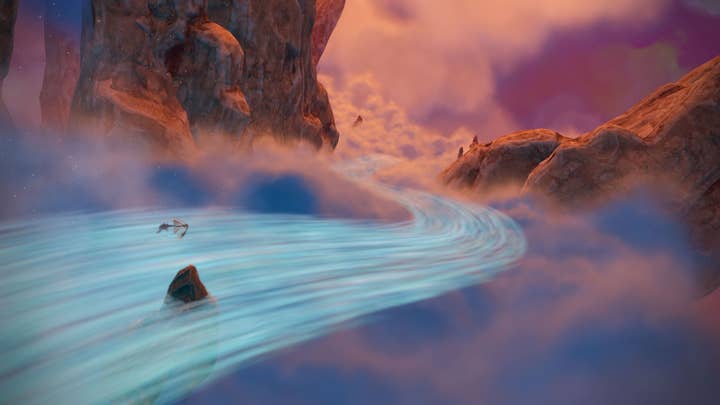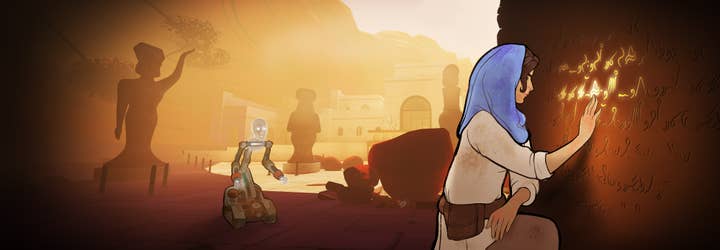Games of the Year 2019: Heaven's Vault
Inkle delivers a deep adventure where everything from the world's history to individual puzzles is open to interpretation
Most video games deal in absolutes. Your character is alive or dead. The door is locked or unlocked. The puzzle solved or unsolved. You win or you lose. Not so with Heaven's Vault.
At the heart of Inkle's wonderful archaeology adventure is an interpretation system built around a fully crafted language, known as Ancient. Most of your time with the game is spent staring at the elegant curves and lines of the game's fictional hieroglyphs, trying to decipher their meaning. Even with suggested words, either based on your previous translations or the context of the inscription, it can be hard or perhaps impossible to complete the puzzle. All you can do is make your best guess.
"Inkle's talented writers choose their words carefully, sparking wild theories in your imagination but never fully confirming whether you are right"
After you've submitted your translation, the game gives you little to no indication as to whether you have got the answer right. There's no fanfare, no flashy celebration effect, no chime... nothing. You're expected to carry on, unvalidated -- unless, of course, the player character Aliya has confirmed each of the words through multiple previous translations.
It's the lack of absolute verification that makes Heaven's Vault feel special. Everything is a mystery, not just the overall story you're following or the universe you're exploring but every fragment of the past you investigate. It makes every word you gradually confirm as correct feel like a significant victory, especially as they come thick and fast further into your playthrough. You slowly begin to understand the symbols and the way they are used, the commonalities across different inscriptions. You begin to read Ancient, strengthening the link between you and Aliya as you continue her journey.
This would be compelling enough as a mechanic, a puzzle where only you can determine whether the solution is correct, but it's all wrapped in an incredible story (as we've come to expect from Inkle). A journey to find a missing robotocist unearths some of this universe's most precious artifacts and taps into your inner detective, sending you on a Da Vinci Code-style quest to uncover truths buried for thousands of years.

Again, interpretation is key. There are no info dumps, no lengthy lore passages and no final exposition breaking down everything you've been through. Instead, Inkle's talented writers choose their words carefully, teasing enough detail to spark wild theories in your imagination but (as with each inscription) never fully confirming whether you are right. Every discovery may answer a burning question but pose a dozen more.
"Not since the original Mass Effect has a sci-fi setting felt so rich, with a deep sense of more than the topline politics, but also the culture that informs everything that came before"
The final reveal alone, plus the choice given at the end, teases with the promise of more mysteries to solve. This is partly to invite you through the New Game Plus mode, where you retain your hard-earned knowledge of Ancient -- but this does not make for an easier ride. Inscriptions become tougher to interpret, but cracking them gives more context, even on phrases you successfully translated last time around.
And, in a decision that is pure genius, even a second playthrough ties in with the narrative, rather than simply being a functional excuse to play again. The people of this world cling to a reincarnationist belief known as the Loop, convinced that all that has happened will happen again. The past is the future, and as you begin your journey anew, you prove this belief to be true.
As you might expect from the developer of 80 Days, a wildly branching narrative structure invites additional playthroughs. There are roughly ten major ruins to discover and explore, but these may be unlocked in different orders depending on your actions and choices. Decisions you make can lock or unlock entire planets, or open entire new threads of the story to follow.

The jewel in Heaven's Vault crown is the truly original world Inkle has created here. This is not your typical civilisation of space-faring white folks, and there's no warp speed or shiny spaceships here. Instead, you find yourself gliding along strange rivers through a nebula, visiting rustic towns and markets. Even the 'moons' they live on aren't the spherical bodies we associate with space, but large unwieldy rocks floating in a cloudy abyss.
Not since the original Mass Effect have I encountered a sci-fi setting that felt so rich, where I got a deep sense of more than the topline politics and other details that frame the present day, but also the culture that informs everything that came before. As you progress through the story, you learn more of the Nebula's history -- not just the years or decades leading up Aliya's journey, but thousands and thousands of years that change your understanding of the world you're exploring.
Combine this with a beautiful and unique art style, plus Laurence Chapman's majestic soundtrack, and you have a very special game -- especially in a year where the blockbusters are stagnating. None of the AAA games I played in 2019 felt as ground-breaking as Inkle's archaeological excursion. Crackdown 3 is just a bigger, flashier Crackdown, Far Cry New Dawn is still Far Cry, and Modern Warfare honestly didn't feel that modern.
But Heaven's Vault feels like a step in a new direction for games. Less is undeniably more here, where confirming a theory about a fictional history or learning the secrets of an ancient language can be just as satisfying as a hefty killcount or high score.

